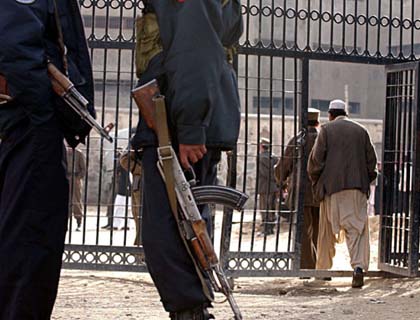KABUL - Afghanistan's internal security service and police use torture and other abusive methods to extract confessions from suspected insurgents held in a number of detention centers around the country, according to a report today by the United Nations mission in Afghanistan.
Interviews over the past year with 379 detainees at 47 facilities found "a compelling pattern and practice of systematic torture and ill-treatment" at a number of centers, the UN study said.
It said 46 per cent of the detainees it spoke with in the centers recounted some sort of torture or abuse.
The UN report also found what it called strong evidence of torture or ill-treatment by Afghan police in several districts of Kandahar province. Canadian soldiers and police mentoring teams operated in the province until last July, when all combat forces were withdrawn.
The Afghan government, in a written response, said the accounts of torture by detainees were exaggerated and denied that torture was systematic. But it acknowledged "deficiencies" due to a lack of training.
The NATO military command in Afghanistan last month ordered its troops to stop turning over detainees to several Afghan prisons and detention centers as what it called a "prudent measure" in light of the UN findings.
NATO is spending billions of dollars on training and equipping the Afghan security forces, including the police. The UN report said the internal security agency is also apparently getting foreign training, but that embassies in Kabul refused to provide details.
In 2009 and 2010, according to the report, NATO forces including Canadian troops transferred approximately 2,000 people to Afghan custody.
Britain and Canada suspended transfers to Afghan internal security detention centers in Kabul. Canada continued to send prisoners to the main Kandahar City prison, although with the caveat that the Afghans should not torture them. The treatment of those prisoners was supposed to be monitored.
There was evidence that people arrested by Canadian troops were handled differently than those detained by Afghan or other NATO forces.
In one case cited in the report, a man recounted how he had been arrested by Afghan border police when he crossed the border into Kandahar province from Pakistan last March carrying a letter someone had asked him to deliver.
He told the UN he was beaten and kicked for days by internal security officers who demanded he confess to carrying a letter for the Taliban. Everyone arrested by Afghan intelligence officers had similar experiences, unless they had been arrested by Canadians, the man is quoted as saying.
"For those arrested by Canadians, two [intelligence] officials were allocated for further interrogation and those interrogated by them never complained about ill treatment."
Detainees told UN investigators that they had been hung by their wrists by chains from walls or ceilings, beaten with rubber hoses and electric cables, and denied access to doctors for their injuries. In several cases cited in the report, prisoners said their Afghan interrogators twisted their genitals or used electric shocks on them.
The UN report said it could document one death from torture in police and intelligence service facilities in April 2011 in Kandahar.
The Afghan government, in its written response to the report, said its security forces treat prisoners humanely "in accordance with the Islamic and humanitarian norms." It denied that the intelligence service interrogators used electric shocks or sexual abuse, and said it tries to investigate allegations of mistreatment.
"Maybe there are deficiencies with a country stricken by war and a wave of suicide attacks and other terroristic crimes," the government said in its response. "We do not claim perfection."
Two earlier UN reports, based on interviews beginning in 2006, also reported that torture and mistreatment were common in detention centers for people accused of crimes unrelated to the long-running war and insurgency.
The UN report said the Afghan government allowed its interviewers access to nearly all the detention centers they wanted to visit. The interviews with detainees were conducted without Afghan officials present.
About half of the detainees interviewed were charged with being members of an insurgent group. Another third were accused of possessing explosives or other weapons or having participated in failed suicide bombings. The rest said they did not know the reason they were arrested, according to the report.
The detainees did not always know who had arrested them. Some said they were picked up by NATO troops or with Afghan troops operating with NATO forces. But several said they could not determine who had arrested them because they were captured in night raids or by masked men or because they were immediately hooded when arrested. (Agencies)

